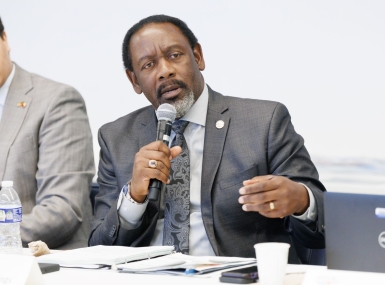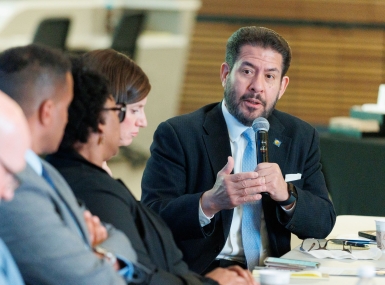Equitable Governance: Executive Summary
Rethinking Governance in America's Counties
“[Equity] issues are not new, they’ve been buried. There’s a thing called ‘disturbance ecology.’ When you have a flood or a fire, there’s devastation and pain. From that, life springs forward. So having this out in the open, talking about it, trying to understand it, and identify where it is, that’s really the only way forward through this. And that’s a good thing for all of us.” –Dave Somers, County Executive, Snohomish County, Wash. |
Counties play a critical role in building healthy and vibrant communities. But some communities experience poorer outcomes in areas such as education, health, safety and economic well-being – often for generations – because of a history of marginalization and unjust policies and practices. The uneven impacts of the COVID-19 pandemic across different communities crystallized the disparities that can exist within a single county.
Counties can lead a paradigm shift. When we ask different questions, we can achieve different outcomes. County leaders are well-positioned to resolve disparities by asking questions grounded in the principles of diversity, equity and inclusion (DEI). By embracing the diversity within communities, ensuring equitable access to resources and opportunities and practicing inclusive decision-making, county leaders create the conditions to achieve better outcomes for all.
The National Association of Counties employs the following definitions of diversity, equity and inclusion.

| Diversity:The presence of different and multiple characteristics that make up individual and collective identities, including race, gender, age, religion, sexual orientation, ethnicity, national origin, socio-economic status, language and physical ability. |
| Equity:The process of identifying and removing the barriers that create disparities in the access to resources and means, and the achievement of fair treatment and equal opportunities to thrive. |

| Inclusion:The creation of an environment in which any individual or group can be and feel welcomed, respected, supported and valued to participate fully. |
Counties are Advancing DEI Through Four Approaches
When inequitable access to opportunities exists, communities experience disparate outcomes that can have devastating and enduring effects. Many county governments are addressing these disparities with solutions that incorporate the principles of DEI. No two counties are the same, and there is no one-size-fits-all approach to achieving equity. As such, county DEI strategies vary across jurisdictions. The Equitable Governance report offers a framework of four primary approaches to advance a DEI strategy: leveraging policy and decision-making powers, enacting or administering programs, forming community partnerships and reimagining county government employment.
The framework is brought to life by the stories and experiences of eight counties demonstrating how a focus on DEI creates communities where everyone can thrive. Regardless of which approach a county takes, county leaders contend that aligning and integrating efforts across sectors is key to successfully addressing barriers facing county residents.
| Policymakers:Counties pass resolutions and ordinances, inform county-wide planning and incorporate DEI language into policies and practices to better assist underserved communities and populations. See Franklin County, Ohio and Sullivan County, N.H. case studies in the full report. |

| Investors:Counties target investments to revitalize underserved communities and use data to better allocate assets and services to address the needs of historically disadvantaged communities. See Missoula County, Mont. and Dane County, Wis. case studies in the full report. |
| Employers:As a major employer in many communities, counties actively cultivate diversity by making workplaces more inclusive, creating better pathways for career growth and fostering more representative leadership in county government. See Marin County, Calif. and Adams County, Colo. case studies in the full report. |

| Partners:Counties engage with community members, leaders, nonprofits and other stakeholders to resolve equity issues and provide essential services. See Buncombe County, N.C. and Miami-Dade County, Fla. case studies in the full report. |









